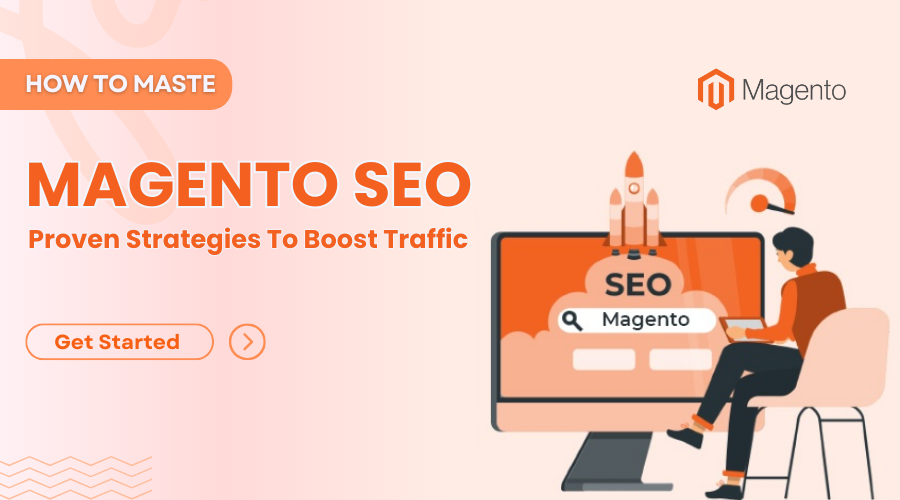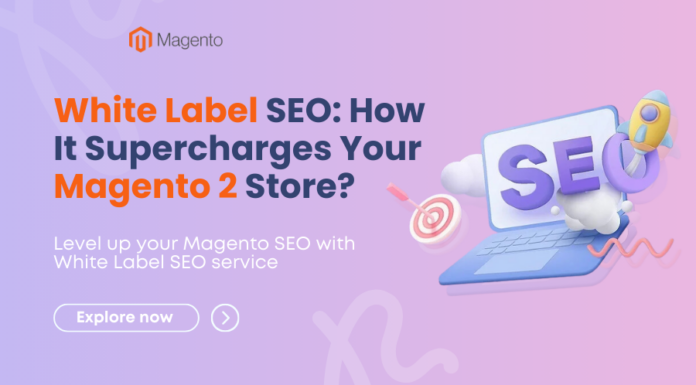
As more and more businesses are moving to online spaces to market their products and services the need for the development and ranking of e-commerce websites has grown exponentially. Magento SEO helps optimize your Magento eCommerce store for top rankings on SERPs.
Every business today wants a website that offers more usability & flexibility without spending a lot of resources. Websites developed using Magento provide exactly that.
However, for a Magento website to appear higher on the SERPs, you need to follow certain strategies and protocols. This article explores these strategies in depth to help you boost the visibility and traffic of your Magento store so stay with us till the end.
Table of Contents
I. What is Magento, and what is Magento SEO?
Magento is an open-source Adobe product that comes with built-in PHP. Used mostly for the development of e-commerce platforms this tool is continuously growing owing to the addition of new ad-ons by the developers.
Magento (also known as Adobe Commerce) is currently used by 239,000 active e-commerce websites as of today which goes to show how effective it is in growing your online presence.
Magento Search Engine Optimization (SEO) describes strategies or adjustments that are specific to Magento websites to improve their search engine rankings. For increased business growth and better revenue from your online Magenta store, you need to follow this platform-specific SEO. Magento 2 is the latest ecommerce platform by Magento.
This can drive more traffic to your website resulting in greater visibility & sales. The need for master Magento SEO is clear from the fact that the average click rate for the websites in the first position in the Google search engine is 28.5% which drastically decreases to 15.7% and 11% in the second and third positions respectively.
With Magento SEO, it is possible to bring your Magento store to the top of Google & other search engines to drive more traffic and sales. The process is quite similar to SEO for a WordPress blog.
II. Magento SEO Checklist: Proven Strategies to Master Magento SEO
This next section explores the main strategies to help you ace Magento SEO. By following these proven master Magento SEO tips, you can boost your efforts and see the results instantly.

1. Crawling and Indexing
Master Magento SEO requires you to optimize your website for easier crawling & indexing. It may include removing duplicate content & using canonical link meta tags. Using sitemaps & Robots.txt may also help in streamlining the website. Optimizing these elements as per SEO guidelines further improves website rankings on SERPs.
- Faceted Navigation & Duplicate Content
Faceted navigation is an issue that most Magento platforms struggle with and that often leads to crawling and indexing problems. In one instance, it leads to more pages available for crawling, and that results in content duplication.
To solve this issue, you need to see how Google is crawling and indexing your magenta platform pages. After that, you need to remove the indexation from the low-quality indexed pages and block the crawling of duplicate content pages through robots.txt. Duplicate pages might also cause problems for you.
- Canonical Link Meta Tags
Best SEO practices suggest that product or category pages must have self-referential canonical tags to inform the search engines about which CMS pages to rank. Using a canonical link meta tag is a great way to prevent duplicate content issues.
- Internal Search Page Indexation
In some cases, Google indexes internal low-quality pages usually found under /category/URL path which leads to low ranking. To prevent Google from crawling these pages, you must add a “noindex” tag to them.
- XML Sitemaps

The creation of an xml sitemap in Magento is important. Crawlers use XML sitemap to explore your Magento ecommerce site to get information regarding the webpages. By controlling the path of crawlers, it is possible to make them only see pages that you want.
Using these sitemaps, you can set up to index all images & products. You can simply add URLs and prioritize them for crawling by search engines. Search engine submission settings streamline the indexing for your website. HTML sitemaps can also be made to facilitate navigation for visitors.
- Robots.txt
After sitemap generation, robots.txt is used to direct the search engine crawlers about visiting your website. This adjustment is crucial especially for sites that prefer faceted navigation. Search engine robots visit your webpages as per your guidelines specified in Robots.txt.
2. Keyword Research
It is an important part of the search engine optimization section for master Magento SEO. Pages that contain target keywords or similar terms in the URL have 45% higher CTR compared to the ones with no keywords.
This strategy involves searching keywords that have two main features. First, they should be more valuable to the target and have the ability to drive more traffic. Primary keyword & meta keywords are determined in this step.
The use of the relevant keywords allows you to optimize your Magento websites to grab the attention of crawlers as well as general consumers. Search engine bots analyze the content relevancy to rank your website at the top. Homepage and CMS pages should contain target keywords for better rankings.
3. URL Optimization
Another way to boost your Magento search engine optimization efforts is to work on consistent & concise URLs. Such URLs are more readable and hence they lead to a better understanding of the page content. This is important for optimizing Magento websites for major search engines.
For Magento SEO, it is a good practice to write SEO friendly URLs that contain the product name and manufacturer, & model number. Some useful URL optimization methods include activating URL rewrites, eliminating unnecessary parameters, and enhancing indexing by optimizing URL structure.
Here is a look at the recommended SEO friendly URL structure:
For category page – Website.com/category/
For sub-category page – Website.com/category/sub category
For Product page – Website.com/category/sub category/product name/
4. On-Page Optimization
On-page SEO is about optimizing the on-site elements of your Magento store. Titles, meta descriptions, & content are the primary on-page elements that may need optimization. Here you need to focus on the following two elements
- Title and Meta Description
The main things that appear in the search results and grab your attention are the Title Tags and Meta Descriptions. Meta titles matter too. You need to make both these things unique & short. If your meta description and title tags are more original they automatically appear more convincing.
- Related Product
You can also add related products on individual product pages on the Magento commerce platform. It can enhance SEO performance. This strategy enhances both user experience and as a result of it user engagement. Moreover, it also increases upselling opportunities which leads to more revenue generation.
5. Internal Linking

This is another effective master Magento SEO strategy that allows search engines to understand your website on a deeper level. The use of natural and diverse anchor text on these internal links is the key here.
Internal linking connects one page of your site to another. Enhanced site navigation and improved web design are the direct results of internal linking. To optimize your internal linking in Magento SEO you need to work on adding URLs to related products & optimize store view.
You can also do that by adding relevant links in articles and other content on your website to ensure search engines crawl your pages with ease. Setting up google analytics may help you see the impact of internal linking efforts.
6. Page Speed Optimization
A website that loads in five seconds or less averages 70 %longer engagement and a reduction of 35% in the bounce rate. This means you must optimize your site for speed to make sure users stay on it longer.
One way to optimize page speed is using Magento Lazy Load. This extension prevents all images from loading at the same time. Instead, it loads them as you scroll through which optimizes user experience.
Magento store owners can also improve the website speed by using CDN & utilizing browsing caching. Another way to do this is by merging and minifying CSS files & JavaScript files. When you merge CSS files, it reduces the loading time.
7. Content Marketing Strategies
Effective content marketing is essential for maximizing your Magento store’s online presence. It helps attract organic traffic from search engines. A well-crafted content marketing strategy can significantly improve your store’s visibility in search engine results pages (SERPs). You can boost your e-commerce success in record time
Below is a look at some effective content marketing strategies:
- Optimize product descriptions with relevant keywords.
- Maintain a blog to provide valuable insights and engage customers.
- Enhance visual content with descriptive metadata and keywords.
- Encourage user-generated content to build trust and authenticity.
- Promote content through various channels to expand your reach and drive traffic.
8. Building Backlinks
Backlinks enhance your website’s authority. They are essential for climbing the search engine rankings. Backlinks act as digital endorsements for your brand. These links signal to search engines the credibility & relevance of your online store.
Implementing effective backlink building strategies involves reaching out to authoritative websites within your industry. You need to build collaborations with them. It can be done by creating valuable content that naturally attracts links.
Prioritize quality over quantity and build white-label backlinks. Earning backlinks from reputable sources is the best way to go. It can only be done when you create content that truly adds value.
It can help establish your Magento store as a trusted destination within your niche. You are more likely to reap the rewards of heightened online visibility & sustained organic growth this way.
9. JavaScript Rendering
Monitoring of content that loads through JavaScript is another aspect that can impact Magento SEO. In the case of JavaScript content loading Google first processes the initial HTML and then moves to the website for rendering content.

You need to intervene in the second step to make sure the search engine sees all the content. Always check the JavaScript-loaded content pages to see if they are indexed. This is important from the Magento SEO standpoint.
You can either use online tools like Googlebot or manually identify the JavaScript-loaded content to determine its index status with the help of the “Site:” search operator. This operator confirms if the search engine can read the content on certain pages or not.
10. Structured Data
Structured data describes the code that informs the search engine about the content of each webpage. It includes things like product reviews & product listings.
Magento stores are usually large, having plenty of product pages. You can use tools like Schema.org to mark things such as products and events. You can also mark-up menu items to help the search engine retrieve the data in the form of snippets.
Structured data provides users with relevant information that adds more value to their experience. This enhances CTR & the findability of your brand in searches. It is important for the Magento store’s SEO success.
11. Product Optimization
You need to optimize product pages as well as descriptions for master Magento SEO. You can optimize product images by using alt-texts & adding descriptive file names with target keywords. Resizing images and using standard formats like JPEG and PNG is also recommended for ecommerce stores.
For product description optimization you need to create keyword rich and unique elements. This can help index specific products quickly. Finally, for products that are out of stock you can add redirects to different pages with related products to reduce bounce rates.
Not optimizing out-of-stock product pages can lead to search engines turning them into 404 error pages which is bad for SEO. Search engines decide to rank your website based on all these factors.
Conclusion
Magento SEO is crucial for the better performance of your e commerce platform. The higher the rank of a website the more your target customers are able to interact with it. To achieve a higher ecommerce website ranking on search engine results pages, you need to adhere to the above-mentioned proven master Magento SEO strategies.
Higher conversions and increased organic traffic are made possible with Magento SEO. Apart from that enhanced user experience & greater brand recognition are just a few ways in which master Magento SEO can benefit your ecommerce platforms in 2024.
So, utilize this tool if your goal is to boost the visibility of your online store and reach your true sales potential.
Author bio
 | Amit Chauhan, a Digital Marketing consultant at Ethane Web Technologies Pvt. Ltd. RankingbySEO since 2011, excels in SEO, Local SEO, Social Media Marketing Optimization (Facebook, Instagram, LinkedIn), and Pay Per Click management. His expertise in E-Commerce Marketing and Meta Ads Management (Facebook & Instagram) drives businesses to wider audiences, boosting sales. Contact him via Linkedin |












![[SALE OFF] Discount 30% All Premium Extensions On Christmas And New Year 2025 christmas-and-new-year-2025](https://landofcoder.b-cdn.net/wp-content/uploads/2024/12/christmas-and-new-year-2025-1-218x150.png)






